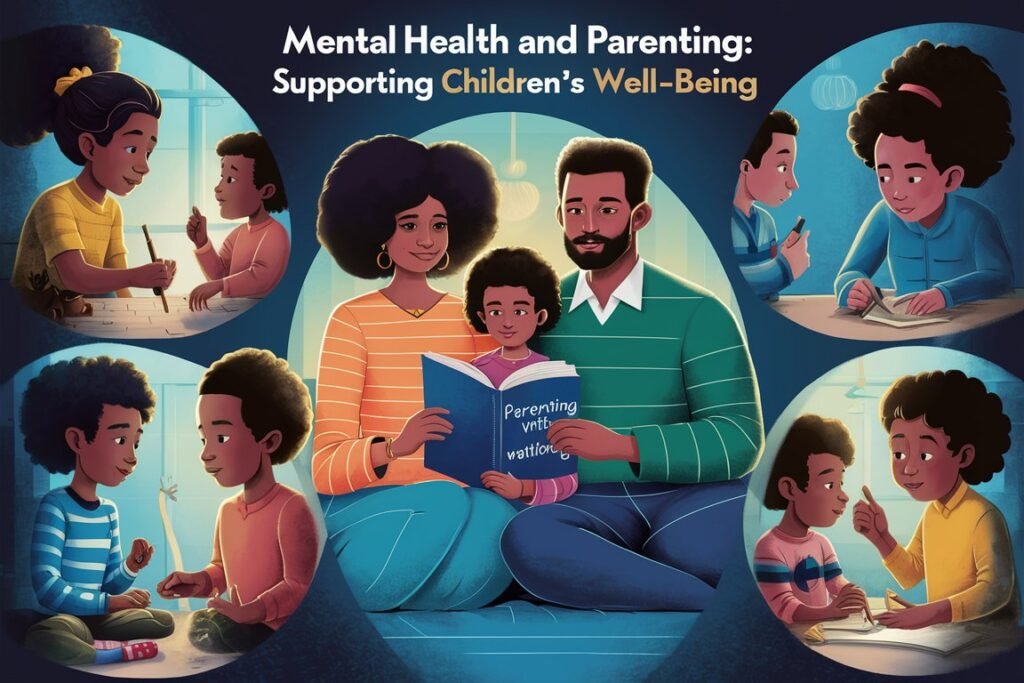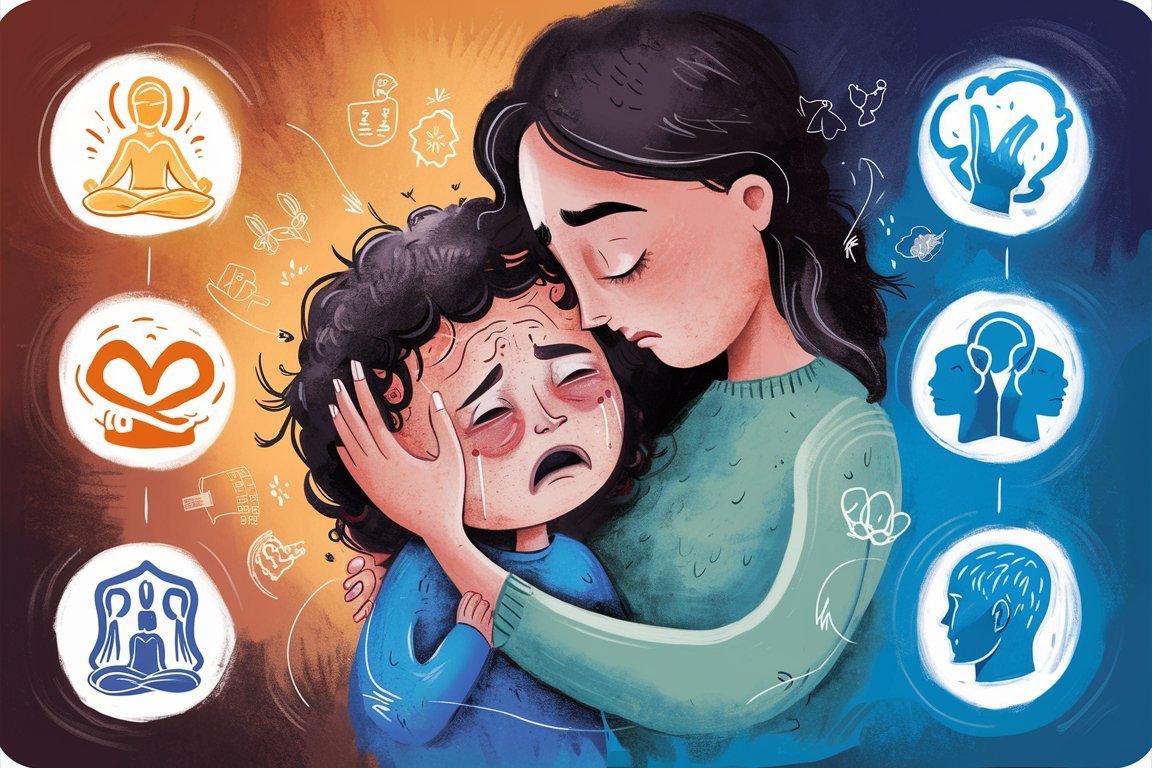Mental Health and Parenting: Supporting Children’s Well-being
Hey there, parents and caregivers! It’s your friendly neighborhood mental health enthusiast, Nita Sharda, here to chat with you about something super important – your child’s mental well-being.
Now, I know what you might be thinking – “Mental health? Isn’t that just for adults?” But let me tell you, supporting your child’s mental health is just as important as making sure they eat their veggies and brush their teeth.
Why Mental Health Matters for Kids
First things first, let’s talk about why mental health is such a big deal for our little ones. Think about it – childhood is a time of huge changes and new experiences. Kids are figuring out who they are, how to make friends, and how to navigate this big, crazy world.
When kids have good mental health, they’re more likely to:
- Feel happy and confident in themselves
- Make and keep positive relationships
- Do well in school and other activities
- Bounce back from tough times
- Grow into healthy, resilient adults
On the flip side, when kids struggle with mental health, it can impact every part of their lives. They might:
- Feel sad, worried, or angry a lot of the time
- Have trouble making friends or getting along with others
- Struggle in school or lose interest in things they used to love
- Take risks or hurt themselves
- Have physical symptoms like headaches or tummy troubles
Common Mental Health Concerns in Kids
So, what are some common mental health concerns that kids might face? Here are a few biggies:
Anxiety
Anxiety is a totally normal feeling that everyone gets sometimes, but when it’s super intense or happens all the time, it might be an anxiety disorder.
Signs of anxiety in kids can include:
- Worrying a lot or being afraid of things
- Avoiding certain situations or activities
- Having physical symptoms like headaches or trouble sleeping
- Being irritable or restless
- Having a hard time focusing
Depression
Depression is more than just feeling sad – it’s a serious mood disorder that can impact every part of a child’s life.
Signs of depression in kids can include:
- Feeling sad, hopeless, or empty a lot of the time
- Not enjoying things they used to love
- Changes in appetite or sleep
- Feeling tired or low energy
- Having trouble focusing or making decisions
- Thinking about death or suicide
ADHD
ADHD is a disorder that affects a child’s ability to pay attention, control impulses, and manage behavior.
Signs of ADHD can include:
- Having trouble focusing or following directions
- Being constantly on the move or fidgeting
- Acting without thinking or interrupting others
- Having a hard time with organization and time management
Trauma and Stress
Trauma and chronic stress can have a big impact on a child’s mental health and development.
Signs of trauma and stress-related disorders can include:
- Flashbacks or nightmares about the traumatic event
- Avoiding people, places, or things that remind them of the trauma
- Feeling constantly on edge or alert for danger
- Having trouble trusting others or forming relationships
- Emotional outbursts or aggression
Supporting Your Child’s Mental Health
Okay, so now that we know why mental health matters and what some common concerns might be, let’s talk about what you can do to support your child’s mental well-being.

Create a Safe and Supportive Home
One of the most important things you can do for your child’s mental health is to create a safe, supportive, and loving home environment.
This means:
- Showing your child lots of love and positive attention
- Setting clear rules and expectations
- Encouraging open and honest communication
- Modeling healthy ways to cope with stress and emotions
- Celebrating your child’s strengths and successes
When kids feel safe, loved, and supported at home, they’re more likely to develop healthy self-esteem and coping skills.
Encourage Healthy Habits
Just like physical health, mental health is closely tied to overall wellness and self-care. Encouraging healthy habits in your child can go a long way in supporting their mental well-being.
Some important habits to focus on include:
- Regular exercise and physical activity
- Eating a balanced and nutritious diet
- Getting enough sleep and rest
- Practicing mindfulness and relaxation
- Limiting screen time and social media use
Helping your child develop these healthy habits early on can set them up for a lifetime of mental and physical wellness.
Foster Positive Relationships
Relationships play a big role in mental health, especially for kids. Positive relationships with family, friends, and other supportive adults can provide a sense of belonging, security, and self-worth.
As a parent, you can foster positive relationships by:
- Spending quality time together as a family
- Encouraging healthy friendships and social connections
- Helping your child develop social skills and empathy
- Modeling positive communication and conflict resolution
- Seeking out supportive community resources and activities
When kids have a strong network of supportive relationships, they’re more likely to feel connected, valued, and resilient in the face of challenges.
Talk Openly About Mental Health
One of the best things you can do to support your child’s mental health is to talk openly and honestly about it.
This means:
- Normalizing conversations about emotions and mental health
- Encouraging your child to express their feelings and experiences
- Validating their emotions and experiences (even if you don’t fully understand them)
- Providing age-appropriate information about mental health and wellness
- Seeking professional help when needed (more on that in a bit)
When kids feel like they can talk openly about their mental health without fear of judgment or stigma, they’re more likely to reach out for help when they need it.
Know the Signs and Seek Help When Needed
Despite your best efforts to support your child’s mental health, sometimes professional help may be needed. It’s important to know the signs that your child might be struggling and to seek help early on.
Some signs that your child might need professional support include:
- Persistent changes in mood, behavior, or personality
- Difficulty functioning in school, at home, or with friends
- Engaging in risky or self-destructive behaviors
- Expressing thoughts of self-harm or suicide
- Physical symptoms with no apparent cause (headaches, stomachaches, etc.)
If you notice any of these signs in your child, don’t hesitate to reach out for help. This might include:
- Talking to your child’s pediatrician or primary care provider
- Seeking a referral to a mental health professional (therapist, counselor, psychologist, etc.)
- Contacting a crisis hotline or emergency services if there is an immediate risk of harm
Remember, seeking help is a sign of strength, not weakness. And the earlier you intervene, the better the outcomes are likely to be.
Putting It All Together
Phew, that was a lot of information! But I hope you’re feeling more informed and empowered to support your child’s mental health and well-being.
Remember, mental health is just as important as physical health, and it’s never too early (or too late) to start prioritizing it.
By creating a safe and supportive home, encouraging healthy habits, fostering positive relationships, talking openly about mental health, and seeking help when needed, you can set your child up for a lifetime of mental wellness and resilience.
And don’t forget – you don’t have to do it alone. There are lots of resources and support systems available to help you and your child navigate the challenges of mental health.
So take a deep breath, give yourself some grace, and know that you’re doing the best you can. Your child is lucky to have you in their corner, fighting for their mental health and happiness.
Until next time, this is Nita Sharda reminding you to take care of yourself and your little ones. You’ve got this, parents!













Leave a Reply